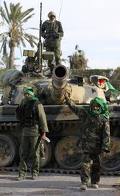Why the islamish riots cannot to have the triumph in Lybie.

The Libyan rebel fighters sheltering behind sand dunes near the government-held town of Ajdabiyah are full of bravado but they appear to lack leadership, soldiering experience and any clear plan of action.
The volunteer force comes from all walks of life — engineers, taxi-drivers and the jobless — united in their hatred of Muammar Gaddafi.
Whether their zeal is enough to capture towns and push through to the capital Tripoli and topple him is highly questionable.
That poses a dilemma for foreign governments who have weighed in on their side with strikes from air and sea against Gaddafi’s forces.
The eastern front in the five-week-old insurrection is at a stalemate since Gaddafi’s troops, pulverised by French war planes, broke off an assault on the rebel capital Benghazi on Saturday and pulled back to Ajdabiyah, 150 km (90 miles) to the south near the Gulf of Sirte.
On Tuesday morning, groups of fighters lounged on the protective dunes about 5 km (3 miles) from the town, chatting and smoking cigarettes. This was the spearhead of the counter-offensive.
“THERE IS NO PLAN”
When asked who was in command, one fighter, Mohamed Bhreka, shrugged and said: “Nobody is. We are volunteers. We just come here. There is no plan.”
There was little sign of the soldiers who had defected from the government army in the early days of the uprising and joined forces with the volunteers.
But there were hundreds of unarmed bystanders, who raised cheers of “God is Greatest” when the occasional round of tank fire from Ajdabiyah thudded into the desert sand behind them.
They were a colourful crew, looking like extras in a “Mad Max” movie. Some had items of camouflage uniform, others wore leather jackets or soccer shirts. Headgear ranged from Arab scarves to motorcycle crash helmets. One man wore his grandfather’s medals from serving alongside the British Army here in World War Two.
Their heavy machine guns were bolted to the back of pick-up trucks and there was a good supply of assault rifles. But some just had knives or iron bars. Field radios were not to be seen.
Some said they were awaiting leadership from Benghazi, others more foreign action. They welcomed the air strikes as essential to knock out Gaddafi’s heavy weapons but said their needs went further.
“We thank the West for what they have done till now. But to move ahead, we need weapons, we need ammunition,” said Fawzi Buktif, an oil project engineer who now runs a training base outside Benghazi. “We would like western trainers.”
But analysts said the West is unlikely to send trainers or weapons due to the potential political and legal fallout. Washington has already indicated it wants to scale back its role while its troops are still involved in two other Muslim countries, Afghanistan and Iraq.
“We have got to be hugely careful about determining just how far the coalition can go,” said British military expert Richard Holmes.
“Look at the American commitment to Vietnam. It starts with advisers and finishes with ground troops. Once you’ve got anyone on the ground, you’ve got the corner of your coat caught in the machine,” he told Reuters in London.
With Gaddafi’s opponents hampered by limited planning , apparent lack of coordination and poorly trained troops, Western governments may find that any expectations their air strikes will provide the vital spark to the rebels are over-optimistic.
SPONTANEOUS REVOLUTION
Back in Benghazi, in the dilapidated court house that serves as their headquarters, rebel officials played down the concerns about a lack of organisation.
“This is a very spontaneous revolution. There was no preparation. People are saying ‘where are your troops?’. Our troops are my son, my doctor, the social worker, the people,” rebel spokesman Essam Gheriani said. “Now it’s more organised. The forces at the front are making some structure,” he added.
A member of the rebel National Council, Abed Al-Hafeez Ghoga, said the rebels had advanced to within 150 km (95 miles) of Sirte on the way to Tripoli in the early days of the uprising without foreign help and were only beaten back by Gaddafi’s artillery and air power.
Asked about the whereabouts of the defecting soldiers, he said that Gaddafi had never properly built up the army, pouring resources instead into his special brigades.
“So we never counted on them anyway,” he said.
Some of the rebel fighters said the officers and defecting soldiers who were at the front in the earlier battles for Ras Lanuf, Brega and Ajdabiyah may have gone back to Gaddafi. Others said they are still in Benghazi making a plan.
The previous day, Ghoga said the rebels had received some military and communications equipment from foreign governments. The air strikes must continue to “level the playing field” for a rebel advance, he said.
Most of the rebels’ weapons and ammunition were taken from captured military arsenals. But that may not be enough for the long haul. Rebels on the frontline also said they had lost the heavy weapons needed to take on Gaddafi’s tanks.
Izzeldin al-Baraki, cleaning a machine gun on a pick-up truck, said he had had one day of training. He did have a commander but he was not at the front, he said. He received any orders by word of mouth rather than by radio.
In the meantime, the motley rebel fighters camp out in their cars, in tents, in abandoned houses or on the ground, relying on their supporters to provide them with food and drinking water.
0 comentarios